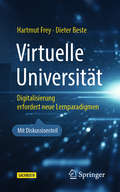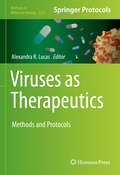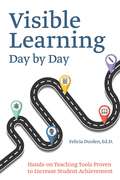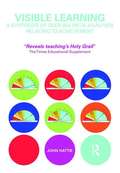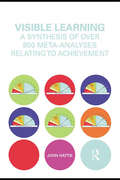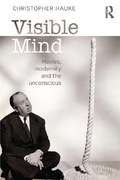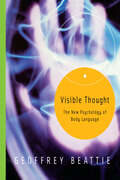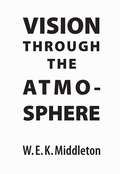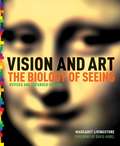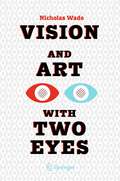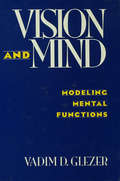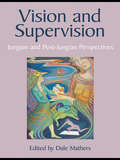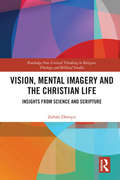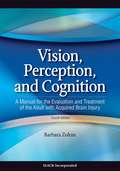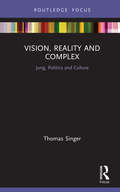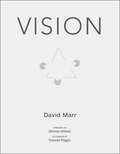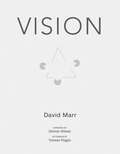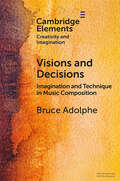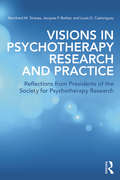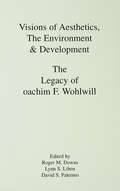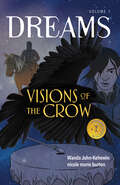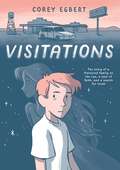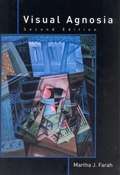- Table View
- List View
Virtuelle Universität: Digitalisierung erfordert neue Lernparadigmen (Technik im Fokus)
by Dieter Beste Hartmut FreyDas Buch vermittelt das Konzept einer globalen, virtuellen Universität in Kombination mit neuen Erkenntnissen aus der Lernforschung. Hierbei werden mithilfe von künstlicher Intelligenz bewegungsorientierte, virtuelle 3-D-Bilder eingebunden. Dadurch wird die Lernbereitschaft und damit auch die Kreativität des Einzelnen angeregt. So werden bereits heute Schweißer in Großunternehmen mittels Datenbrille und intelligenter Avatare ausgebildet. Über eine virtuelle Universität lassen sich Forschungsprojekte initiieren und koordinieren. Problemlösungen lassen sich mit der Verwendung von Avataren in virtuellen Hörsälen erarbeiten. Die Zertifizierung erfolgt nicht mehr über das Abfragen von Wissensinhalten, sondern über die Fähigkeit Probleme zu lösen. Weitere wichtige Aspekte einer virtuellen Universität sind, im Vergleich zu den klassischen Universitäten, die geringen Kosten, die Möglichkeit bei der Entwicklung des Contents die besten Wissenschaftler zu beteiligen sowie die immer mehr um sich greifende Sekundär- und Tertiärforschung. Eine virtuelle Universität bietet die Chance der Emanzipation gesellschaftlicher Praxis von Wissenschaft durch Wissenschaft und Immunisierung gesellschaftlich geltende Ideologien und Interessenstandpunkte gegen wissenschaftliche Aufklärungsansprüche.
Viruses as Therapeutics: Methods and Protocols (Methods in Molecular Biology #2225)
by Alexandra R. LucasThis detailed volume explores methods and techniques reflecting how viruses can be a beneficial force for all levels of life as well as the mammalian microbiota. Beginning with methods for the development and study of viruses, the book continues with current techniques and approaches used to develop new treatments from virus-derived vaccines to vectors and proteins, such as a range of models and methods designed to measure therapeutic efficacy of virus-derived biologics and therapeutic proteins. Written for the highly successful Methods in Molecular Biology series, chapters include introductions to their respective topics, lists of the necessary materials and reagents, step-by-step, readily reproducible laboratory protocols, and tips on troubleshooting and avoiding known pitfalls. Authoritative and practical, Viruses as Therapeutics: Methods and Protocols is an ideal guide for researchers working to further understand how viruses can benefit lifeforms and even prevent damage from other viruses.
Visible Learning Day by Day: Hands-On Teaching Tools Proven to Increase Student Achievement
by Dr. Felicia DurdenBe a Better Teacher You want the best for your students. But how do you know which techniques really work? Visible Learning Day by Day has the answers. Packed with 50 proven strategies, this workbook provides classroom-ready worksheets, resources and self-evaluations to help you implement visible learning in: • Collaboration with educators • Teacher clarity and goal setting • Parent communication • Math and literacy programs • Instruction planning • Classroom management • Assessment and grading This innovative approach to teaching makes students active participants in their own education. Visible learning will improve your student&’s growth by making the teaching process open and accessible to them.
Visible Learning: A Synthesis of Over 800 Meta-Analyses Relating to Achievement
by John Hattie<p>This unique and ground-breaking book is the result of 15 years research and synthesises over 800 meta-analyses on the influences on achievement in school-aged students. It builds a story about the power of teachers, feedback, and a model of learning and understanding. The research involves many millions of students and represents the largest ever evidence based research into what actually works in schools to improve learning. Areas covered include the influence of the student, home, school, curricula, teacher, and teaching strategies. A model of teaching and learning is developed based on the notion of visible teaching and visible learning. <p>A major message is that what works best for students is similar to what works best for teachers – an attention to setting challenging learning intentions, being clear about what success means, and an attention to learning strategies for developing conceptual understanding about what teachers and students know and understand. <p>Although the current evidence based fad has turned into a debate about test scores, this book is about using evidence to build and defend a model of teaching and learning. A major contribution is a fascinating benchmark/dashboard for comparing many innovations in teaching and schools.</p>
Visible Learning: A Synthesis of Over 800 Meta-Analyses Relating to Achievement (Corwin Literacy Ser.)
by John HattieThis unique and ground-breaking book is the result of 15 years research and synthesises over 800 meta-analyses on the influences on achievement in school-aged students. It builds a story about the power of teachers, feedback, and a model of learning and understanding. The research involves many millions of students and represents the largest ever evidence based research into what actually works in schools to improve learning. Areas covered include the influence of the student, home, school, curricula, teacher, and teaching strategies. A model of teaching and learning is developed based on the notion of visible teaching and visible learning. A major message is that what works best for students is similar to what works best for teachers – an attention to setting challenging learning intentions, being clear about what success means, and an attention to learning strategies for developing conceptual understanding about what teachers and students know and understand. Although the current evidence based fad has turned into a debate about test scores, this book is about using evidence to build and defend a model of teaching and learning. A major contribution is a fascinating benchmark/dashboard for comparing many innovations in teaching and schools.
Visible Mind: Movies, modernity and the unconscious
by Christopher HaukeWhy is the moving image so important in our lives? What is the link between the psychology of Jung, Freud and films? How do film and psychology address the problems of modernity? Visible Mind is a book about why film is so important to contemporary life, how film affects us psychologically as individuals, and how it affects us culturally as collective social beings. Since its inception, film has been both responsive to historical cultural conditions and reflective of changes in psychological and emotional needs. Arising at the same moment over a century ago, both film and psychoanalysis helped to frame the fragmented experience of modern life in a way that is still with us today. Visible Mind pays attention to the historical context of film for what it can tell us about our inner lives, past and present. Christopher Hauke discusses a range of themes from the perspective of film and analytical psychology, these include: The Face, The Shadow, Narrative and Story, Reality in Film, Cinema and the American Psyche, the use of Movies in the Psychotherapy Session and Archetypal themes in popular film. Unique to Visible Mind, six interviews with top film professionals from different departments both unlocks the door on the role of the unconscious in their creative process, and brings alive the reflexive critical thinking on modernity, postmodernity and Jungian psychology found throughout Visible Mind. Visible Mind is written for academics, filmmakers and students who want to understand what Jung and Freud's psychology can offer on the subject of filmmaking and the creative process, for therapists of any background who want to know more about the significance of movies in their work and for film lovers in general who are curious about what makes movies work.
Visible Thought: The New Psychology of Body Language
by Geoffrey BeattieAre you saying one thing whilst your hands reveal another? Are you influenced by other people's body language without even knowing it? Darting through examples found anywhere from the controlled psychology laboratory to modern advertising and the Big Brother TV phenomenon, official Big Brother psychologist Geoffrey Beattie takes on the issue of what our everyday gestures mean and how they affect our relationships with other people. For a long time psychologists have misunderstood body language as an emotional nonverbal side effect. In this book Geoffrey Beattie ranges across the history of communication from Cicero to Chomsky to demonstrate that by adding to or even contradicting what we say, gestures literally make our true thoughts visible. A unique blend of popular examples and scientific research presented in language that everybody can understand, Visible Thought is an accessible and groundbreaking text that will appeal to those interested in social psychology and anyone who wants to delve beneath the surface of human interaction. Geoffrey Beattie is the official Big Brother psychologist and Professor at the Department of Psychology, University of Manchester. He is a recipient of the Spearman Medal awarded by the British Psychological Society for 'published psychological work of outstanding merit'.
Vision Through the Atmosphere (Heritage)
by W.E.K. MiddletonIn recent years, the problem of seeing through the atmosphere has been given intensive and costly consideration in several quarters, but particularly in the Untied States and Great Britain. A problem which once concerned mainly the meteorologists has become of great importance in military tactics as well as in peacetime transportation. The present volume is the only full account in English of the physical, physiological, and psychological factors which lie at the basis of the calculation of the range of vision through the atmosphere. There is an extended chapter on instruments and one on the author's own theory of the colours of distant objects. The figures are from many sources althrough many of them have been drawn specially for this book. The bibliography contains 420 entries nearly all of which are directly referred to in the text.
Vision and Art
by Margaret S. Livingstone David Hubel<p>With the original release of Vision and Art in 2002, Harvard professor Margaret Livingstone successfully bridged the gap between science and art, exploring how great painters fool the brain: why Mona Lisa’s smile seems so mysterious, or Monet’s Poppy Field appears to sway. In the revised and expanded edition, Livingstone presents two new chapters of her latest observations, has substantially expanded other chapters, and updates the rest of the existing text with new insights gleaned from her ongoing research, bringing the book to the cutting edge in the field of neuroscience. <p>Accompanying Livingstone’s lively prose are many charts and diagrams that lucidly illustrate her points, as well as in-depth analyses of the phenomena found in major works of art. Be it the explanation of common optical illusions or the breakdown of techniques painters use to create those illusions, Vision and Art provides a wealth of information for artists, scholars, and scientists alike.</p>
Vision and Art with Two Eyes (Vision, Illusion and Perception #3)
by Nicholas WadeThis book celebrates binocular vision by presenting illustrations that require two eyes to see the effects of cooperation and competition between them. Pictures are flat but by printing them in different colours and viewing them through similarly coloured filters (included with the book) they are brought to life either in stereoscopic depth or in rivalry with one another. They are called anaglyphs and all those in the book display the ways in which the eyes interact. Thus, the reader is an integral element in the book and not all readers will see the same things. The history, science and art of binocular vision can be experienced in ways that are not usually available to us and with images made specifically for this book. The study of vision with two eyes was transformed by the invention of stereoscopes in the early 19th century. Anaglyphs are simple forms of stereoscopes that have three possible outcomes from viewing them – with each eye alone to see the monocular images, with both eyes to see them in stereoscopic depth or rivalry, or without the red/cyan glasses where they can have an appeal independent of the binocularity they encompass. Through the binocular pictures and the words that accompany them there will be an appreciation of just how remarkable the processes are that yield binocular singleness and depth. Moreover, the opportunities for expressing these processes are explored with many examples of truly binocular art.
Vision and Mind: Modeling Mental Functions
by Vadim D. GlezerThe usual method for studying mental processes entails taking words in linguistics -- or concepts in logic -- and establishing the connections and relationships between them. Thus, the traditional approach to semantic problems -- those of meaning and understanding -- is through language. Most researchers agree that thought and language are generated by deep-seated semantic structures determined by the structure of the brain. Until now, however, all attempts at constructing semantic models have been made on the basis of linguistic material alone, without taking brain structure into account. Analysis of these models shows them to be as inadequate as those based on the method of the black box. This book approaches the problem of the organization of higher psychological functions a different way -- by analyzing the functional organization of the neural structures that gradually form universal categories from "raw" sensory material. At the higher levels of the brain's operation, these universals correspond to the basic categories of thought and language. The visual system provides rewarding material for such an approach, both because it is relatively well researched and because it is the main source of sensory information in humans. With this in mind, this monograph examines the whole process of the transformation and description -- the coding of visual information. The most important aspect of this process is the transition from the description of visual space to the description of individual objects and the relationships between them. This transition is made possible by the existence in the visual system of various mechanisms that developed during evolution as a result of environmental influences. Written for a wide circle of investigators in disciplines associated with different aspects of the functioning of the brain -- physiologists and psychologists -- this book is also of importance to engineers and mathematicians working on the problems of artificial intelligence, and linguists and philosophers interested in the deep structures that form the universals of thought and language.
Vision and Supervision: Jungian and Post-Jungian Perspectives
by Dale MathersSupervision in analytical psychology is a topic that until recently has been largely neglected. Vision and Supervision draws on archetypal, classical, and developmental Post-Jungian theory to explore supervision from a variety of different avenues. Supervision is a critical issue for therapists in many training programmes. Quality of training and of therapeutic treatment is paramount, and increasingly the therapy profession is having to devise ways of assessing and monitoring themselves and each other. In this book, Dale Mathers and his contributors emphasise a model of supervision based on parallel process, symbol formation and classical Jungian analysis rather than developmental psychology or psychoanalytic theory, to show how respect for diversity can innovate the practice of supervision. Divided into three sections, this book covers: the framework of supervision, its boundaries and ethical parameters individuation supervision in different contexts including working with organisations and multicultural perspectives. Written by experienced clinicians, Vision and Supervision brings insights from analytical psychology to the supervisory task and encourages the supervisor to pay as much attention to what does not happen in a session as to what does. It offers a fresh perspective for analysts and psychotherapists alike, as well as other mental health professionals involved in the supervisory process.
Vision, Mental Imagery and the Christian Life: Insights from Science and Scripture (Routledge New Critical Thinking in Religion, Theology and Biblical Studies)
by Zoltán DörnyeiThis book uniquely explores how the notion of vision is presented in modern science and the Bible, and how it can be applied to contemporary Christian contexts. The word "vision", our ability to see, has been described by an increasing body of scholarship in the social sciences as our capacity for mental imagery and imagination. As such, this unique cognitive capability has been utilised in many fields for a variety of purposes, from arts and psychotherapy to politics and business management, and even for performance enhancement in sports. The current book argues that a better understanding of vision can have far-reaching practical implications for Christian life and ministry by helping people to align themselves with God’s specific purposes. After a theoretical overview that integrates scientific and theological insights, the final chapters present a variety of strategies that can help believers to discern God’s call through the use of mental imagery and then to develop and cultivate the perceived vision. The book examines the scientific and biblical principles of vision in a comprehensive manner, with a special emphasis on the practical implications of the issue. As such, it will be of great interest to scholars of Theology, Biblical Studies and Church Growth/Leadership, as well as Organisational Behaviour, Business Management and Psychology.
Vision, Perception, and Cognition: A Manual for the Evaluation and Treatment of the Adult with Acquired Brain Injury
by Barbara ZoltanVision Perception and Cognition, Fourth Edition is a concisely structured text that expertly addresses clinical reasoning and decision making for the entire evaluation and treatment process of the adult with acquired brain injury. Provided are theoretical information, guidelines for both static and dynamic assessment, information on specific standardized evaluations, guidelines for adaptive and restorative treatment based on described theoretical and evidence-based information, and information on environmental impact of client performance.
Vision, Reality and Complex: Jung, Politics and Culture (Focus on Jung, Politics and Culture)
by Thomas SingerVision, Reality and Complex brings together a rich selection of Thomas Singer’s scholarship on the development of the cultural complex theory and explores the relationship between vision, reality, and illusion in politics and psyche. The chapters in this book discuss the basic principles of the cultural complex theory in various national and international contexts that span the Clinton, Bush, Obama and Trump eras. Each chapter grounds this theory in practical examples, such as race and healthcare in the United States, or in specific historical and international conflicts between groups, whether they be ethnic, racial, gender, local, national or global. With chapters on topics including mythology, leadership, individuation, revolution, war, and the soul, Singer’s work provides unique insights into contemporary culture, activism, and politics. This collection of essays demonstrates how the cultural complex theory applies in specific contexts while simultaneously having cross-cultural relevance through the reemergence of complexes throughout history. It is essential reading for academics and students of Jungian and post-Jungian ideas, politics, sociology, and international studies, as well as for practicing and trainee analysts alike.
Vision: A Computational Investigation into the Human Representation and Processing of Visual Information
by David Marr Tomaso Poggio Shimon UllmanDavid Marr's posthumously published Vision (1982) influenced a generation of brain and cognitive scientists, inspiring many to enter the field. In Vision, Marr describes a general framework for understanding visual perception and touches on broader questions about how the brain and its functions can be studied and understood. Researchers from a range of brain and cognitive sciences have long valued Marr's creativity, intellectual power, and ability to integrate insights and data from neuroscience, psychology, and computation. This MIT Press edition makes Marr's influential work available to a new generation of students and scientists. In Marr's framework, the process of vision constructs a set of representations, starting from a description of the input image and culminating with a description of three-dimensional objects in the surrounding environment. A central theme, and one that has had far-reaching influence in both neuroscience and cognitive science, is the notion of different levels of analysis -- in Marr's framework, the computational level, the algorithmic level, and the hardware implementation level. Now, thirty years later, the main problems that occupied Marr remain fundamental open problems in the study of perception. Vision provides inspiration for the continuing efforts to integrate knowledge from cognition and computation to understand vision and the brain.
Vision: A Computational Investigation into the Human Representation and Processing of Visual Information
by David MarrAvailable again, an influential book that offers a framework for understanding visual perception and considers fundamental questions about the brain and its functions. David Marr's posthumously published Vision (1982) influenced a generation of brain and cognitive scientists, inspiring many to enter the field. In Vision, Marr describes a general framework for understanding visual perception and touches on broader questions about how the brain and its functions can be studied and understood. Researchers from a range of brain and cognitive sciences have long valued Marr's creativity, intellectual power, and ability to integrate insights and data from neuroscience, psychology, and computation. This MIT Press edition makes Marr's influential work available to a new generation of students and scientists. In Marr's framework, the process of vision constructs a set of representations, starting from a description of the input image and culminating with a description of three-dimensional objects in the surrounding environment. A central theme, and one that has had far-reaching influence in both neuroscience and cognitive science, is the notion of different levels of analysis—in Marr's framework, the computational level, the algorithmic level, and the hardware implementation level. Now, thirty years later, the main problems that occupied Marr remain fundamental open problems in the study of perception. Vision provides inspiration for the continuing efforts to integrate knowledge from cognition and computation to understand vision and the brain.
Visions and Decisions: Imagination and Technique in Music Composition (Elements in Creativity and Imagination)
by Bruce AdolpheThis Element investigates the balance and interaction of imagination (visions) and technique (decisions) in the composition of music and includes current scientific research on dreams, the hypnagogic state, emotions, and feelings. It also includes thoughts of composers past and present, and examines how works start from visions in a range of music, comparing musical ideas and techniques to models in other creative disciplines. The Element elucidates aspects of musical discourse by imagining how Haydn, Mozart, and other composers would order falafel for takeout. This unorthodox approach emphasizes parallels between music and theater that are central to this Element.
Visions in Psychotherapy Research and Practice: Reflections from the Presidents of the Society for Psychotherapy Research
by Jacques P. Barber Bernhard Strauss Louis CastonguayThe Society for Psychotherapy Research (SPR) is devoted to the development and dissemination of research, as well as the integration of empirical, theoretical, and clinical knowledge in psychotherapy. A highlight of the SPR annual meeting is the presidential address, wherein the president delivers what many view as the most important presentation of their career. In Visions of Psychotherapy, Bernhard Strauss, Jacques Barber, and Louis Castonguay, three recent past presidents, compile the preceding 20 presidential addresses from SPR into a single volume. Then, the living presidents (19 of the 20) comment on how the visions they described in their addresses have developed over time.
Visions of Aesthetics, the Environment & Development: the Legacy of Joachim F. Wohlwill (Penn State Series on Child and Adolescent Development)
by Roger M. Downs Lynn S. Liben David S. PalermoDerived from a conference honoring the legacy of Joachim Wohlwill, this volume is designed to reflect as many facets of the late scholar's wide-ranging work as possible. As its title indicates, the book identifies three broad areas in which Wohlwill made significant contributions: art and aesthetics, human-environment interaction, and concepts of development. In each of these areas Wohlwill made seminal contributions, helping to shape, maintain, and even change the direction of research and thought. Specific topics addressed here by his colleagues, students, and contemporaries include: the shape of development, the intermingling of perception and cognition, the balance between innate and acquired processes, the relation between environmental and ecological psychology, the development of the ability to use external representations of the physical environment, and the way world views underpin beliefs about the nature of development.
Visions of the Crow (Dreams #1)
by Wanda John-Kehewin&“Your ancestors have called us to help you.&”&“I think y'all have the wrong number.&” Damon Quinn just wants to get through his senior year unscathed. His mom struggles with alcohol and is barely coping with the day-to-day. Marcus and his cronies at school are forever causing Damon trouble. The new girl, Journey, won't mind her own business. To make matters worse, now a mysterious crow is following him everywhere. After he is seized by a waking dream in the middle of a busy street, Damon is forced to confront his mom with some hard questions: Why haven't I met my dad? Where did we come from? Who am I? Damon must look within himself, mend the bond with his mother, and rely on new friends to find the answers he so desperately needs. Travelling through time and space, Damon will have to go back before he can move forward.
Visions of the Crow (Dreams #1)
by Wanda John-Kehewin&“Your ancestors have called us to help you.&”&“I think y'all have the wrong number.&” Damon Quinn just wants to get through his senior year unscathed. His mom struggles with alcohol and is barely coping with the day-to-day. Marcus and his cronies at school are forever causing Damon trouble. The new girl, Journey, won't mind her own business. To make matters worse, now a mysterious crow is following him everywhere. After he is seized by a waking dream in the middle of a busy street, Damon is forced to confront his mom with some hard questions: Why haven't I met my dad? Where did we come from? Who am I? Damon must look within himself, mend the bond with his mother, and rely on new friends to find the answers he so desperately needs. Travelling through time and space, Damon will have to go back before he can move forward.
Visitations
by Corey EgbertInspired by true events, this haunting yet hopeful young adult graphic novel weaves together family dynamics, mental illness, and religion—perfect for fans of Hey, Kiddo.Corey’s mom has always made him feel safe. Especially after his parents’ divorce, and the dreaded visitations with his dad begin. But as Corey grows older, he can’t ignore his mother’s increasingly wild accusations. Her insistence that God has appointed Corey as his sister’s protector. Her declaration that Corey’s father is the devil.Soon, she whisks Corey and his sister away from their home and into the boiling Nevada desert. There, they struggle to survive with little food and the police on the trail. Meanwhile, under the night sky, Corey is visited by a flickering ghost, a girl who urges him to fight for a different world—one outside of his mother’s spoon-fed tales, one Corey must find before it’s too late.Drawing inspiration from his own upbringing in the Mormon church, Corey Egbert welcomes readers on an emotionally stirring, nuanced journey into the liminal spaces between imagination and memory, faith and truth.
Visual Agnosia (Second Edition)
by Martha J. FarahThe second edition of the classic book on visualagnosia, updated to include disorders of semantic knowledge andtopographic recognition, and integrating perspectives from functional neuroimaging throughout.
Visual Allusions: Pictures of Perception (Psychology Library Editions: Perception #32)
by Nicholas WadeIn this book a leading researcher and artist explores how we see pictures and how they can communicate messages to us, both directly and indirectly by making allusions to objects in space or to stored images in our minds. Originally published in 1990, Dr Wade provides fascinating examples of pictures that communicate hidden messages, either by implying something else, or by a shape or portrait which is carried covertly within another design. He analyses image processing stages in vision, demonstrating that the various stages may be related to styles in representational art. He shows how the way we have been taught to look at and recognise objects, affects the way we see them. The book lavishly illustrates with original examples of visual allusions and includes detailed practical advice on how photographers and designers can create them. Essential reading for photographers, designers, artists, people in film and television, and anyone involved in visual science , visual communication and advertising.
